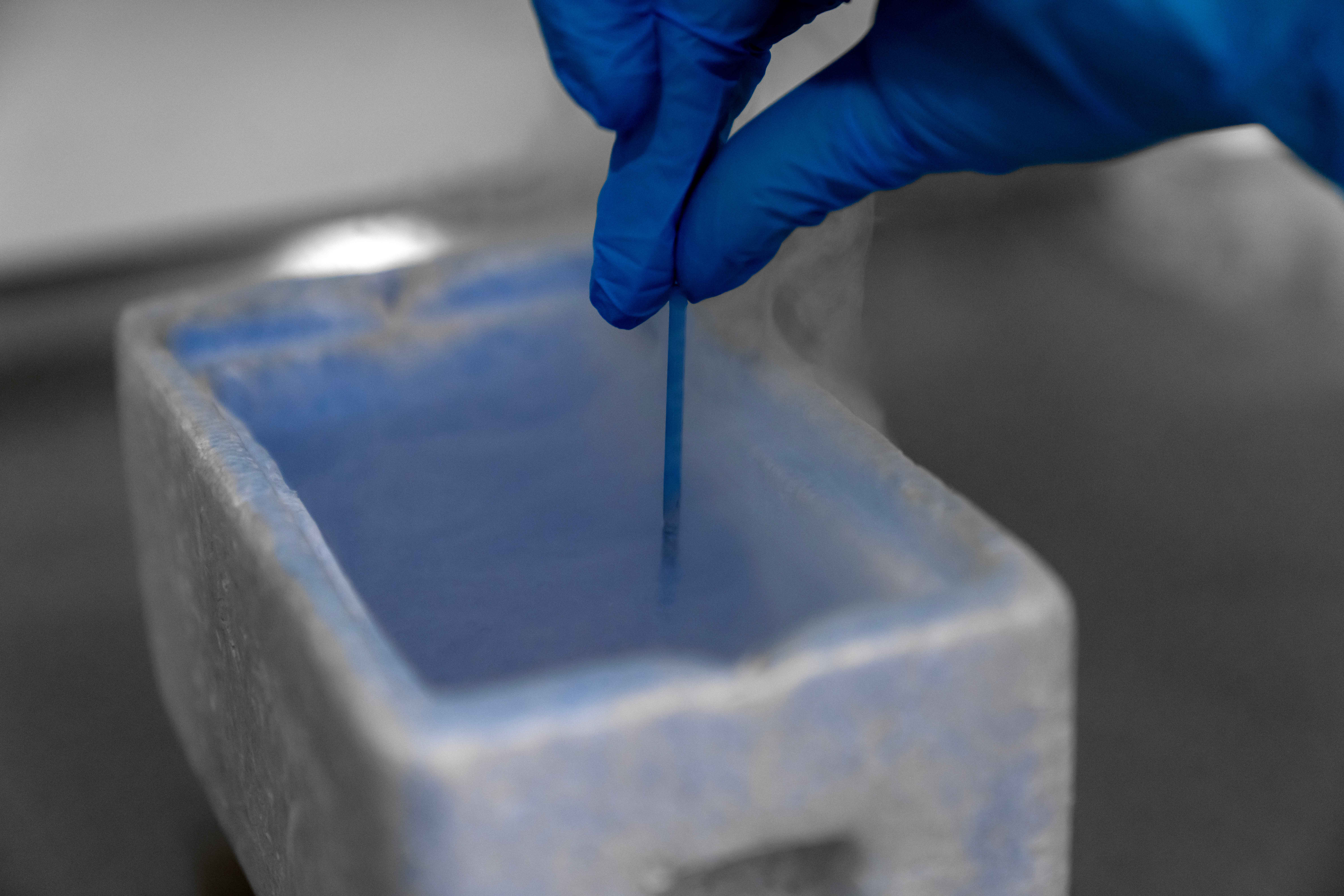Even though they are an extremely rare medical event, decidual casts made a splash on TikTok recently after Madi Swegle shared her story (also covered by Today) of passing a decidual cast. Swegle is a Labor and Delivery nurse, but she had never heard of a decidual cast before. This is no surprise. As this analysis noted, decidual casts are so rare that up until 2021 “less than 40 cases [were] reported in the medical literature over the last 109 years.” [1]
Swegle said the worst part of her painful and frightening experience was the anxiety of not knowing what was happening. Again, passing a decidual cast is a rare medical event. But here’s the rundown of what a decidual cast is and what to do if you experience one… just in case!
What is a decidual cast?
First, let’s break down the phrase “decidual cast,” also referred to as “decidual cast shedding.” The decidua is the functional layer of the endometrium, which is the lining of the uterus or womb. The decidua is the layer in which a blastocyst implants if conception occurs.
After ovulation, the corpus luteum produces progesterone. This signals the cells in the endometrium to change in order to prepare to receive a newly conceived blastocyst and to make the placenta. This process is called decidualization. So, we can think of the decidua as the layer of the endometrium that is ready for pregnancy or already part of a pregnant womb.
In art, a “cast” is a mold made by an artist as part of a sculpture or model. So, a decidual cast is a mold of your uterus made out of the decidua.
This is what’s supposed to happen in the uterus each cycle
Normally, a new menstrual cycle starts when the old decidua breaks up and dissolves. The decidua lining is shed over the course of a few days. This is the normal period experience most women are used to.
This is what happens when you have a decidual cast
In the case of a decidual cast, the decidua doesn’t break up at all. Instead, it’s expelled as a single piece of tissue roughly the size of the inside of your uterus. This means it’s about two inches long and about an inch thick. Cleveland Clinic says patients who have experienced decidual casts report them to range in size from a walnut to a small lime. A cast may be triangular in shape and look like a tiny replica of the uterus. This is understandably a rather alarming object to pass vaginally!
Decidual casts are not the same as blood clots
Endometrial tissue will feel firm and solid and will likely be a reddish color. Cast tissue is not to be confused with a blood clot, which may look more blackish/red and have a jelly-like consistency.
Pain is part of most women’s experience
Passing a decidual cast is also quite painful. Normally, the cervix only needs to open (dilate) a small amount to let the blood, mucus, and dissolved tissue of a typical period to pass through. But in the case of a large piece of tissue like a decidual cast, the uterus has to work hard to dilate the cervix enough to pass the tissue [2]. Thus, the experience is more like labor cramps rather than normal period cramps… except without the benefit of having time to prepare, as you typically would before giving birth. Once the cast is passed, symptoms and pain will cease. Passing a decidual cast is similar to having all the aspects of a period condensed into a short amount of time rather than spread out over the course of several days.
What causes decidual casts?
Causes in a pregnant woman
Decidual casts are typically associated with ectopic pregnancies, even though most women who experience an ectopic pregnancy will not experience decidual casts. However, in some cases a decidual cast reveals an ectopic pregnancy. If a woman has had a positive pregnancy test, and passes a mass of tissue that does not contain the expected products of conception, like the gestational sac, her embryo is likely developing outside of the uterus. Despite having passed the decidual cast, the woman will still need to receive treatment for her ectopic pregnancy in order to save her life. This is why it is always important to have a medical evaluation after unusual gynecological symptoms like severe pelvic pain or passage of mysterious tissue.
I was only able to find one known case of someone who experienced a decidual cast that was also a miscarriage. The miscarriage was classified as a complication of the patient’s Depo Provera injection. If you have not used progestin-based contraceptives and experience a decidual cast, you could have an ectopic pregnancy.
Causes in a non-pregnant woman are more common with progestin-only birth control users
Most documented cases of decidual casts in women who weren’t pregnant involved progestin-containing contraception [3] . Some users were on the Pill, which contains both synthetic progesterone (progestin) and estrogen [4]. But most took progestin-only contraception like Depo Provera or the Nexplanon implant [5][6]. These case studies included patients who had recently ceased using hormonal contraception. In Madi Swegle’s case, she took hormonal birth control before she started in vitro fertilization (IVF) treatment (more on birth control and infertility here). (Note that the recently approved over-the-counter Opill birth control pill is also progestin-only.)
The surge in reported cases of decidual casts during 2021 prompted some researchers to question whether there was a connection to COVID-19 vaccines. A survey of women who experienced menstrual cycle irregularities during the pandemic and in particular after receiving a dose or doses of COVID-19 vaccine found that only 11% of women who self-reported a decidual cast were on hormonal contraception at the time [1].
Since a decidual cast is more commonly associated with ectopic pregnancies, it is important to contact an OB/GYN and take a pregnancy test to rule out this dangerous possibility, should you experience one. This is especially true since unexpected pregnancies are a known risk of hormonal contraception, and certain forms of contraception may increase your risk of ectopic pregnancy.
Is a decidual cast bad?
A decidual cast itself is not bad, although it is often quite painful. But it does indicate that something else is wrong. If the cast is caused by birth control, the pain and symptoms will stop as soon as the cast is past. But this signals that the progestin in birth control is just not the same as the progesterone your body makes. On birth control, the endometrium isn’t being formed, matured, and shed in the way it would be if a woman was only exposed to the natural progesterone and estrogen of her cycle.
Luckily, there are side effect-free ways to prevent and space pregnancies through fertility awareness! With fertility awareness you can learn about your fertility and work with your body to support your whole-body health. Fertility awareness allows your hormones to fulfill the important functions for which they’re intended within multiple organ systems, not just within your endometrium.
When decidual casts occur during pregnancy (and are therefore unrelated to synthetic hormone use), the pain, bleeding, and tissue passed may be mistaken for a miscarriage. If the tissue is confirmed to be only endometrial tissue, and climbing human chorionic gonadotropin (hCG) levels continue to indicate that the woman is pregnant, not miscarrying, that pregnancy is necessarily outside of the womb. This is an ectopic pregnancy. In this case, the decidual cast itself is not bad or dangerous. It is an indication of a dangerous condition that requires immediate medical attention.
The bottom line
Despite the internet’s recent interest in decidual casts, the likelihood that you’ll need to be on the lookout for one is low. But as we’ve discussed above, certain things may potentially increase your risk, such as using progestin-only birth control. Regardless, open discussions about women’s health and the downsides of synthetic hormones are always worth having, especially as women are often not fully informed of the risks and side effects that come with hormonal birth control use. If you are ready to learn more about fertility awareness, you can start here to find out which method might be best for you!
References:
[1] Parotto, T., Thorp, J.A., Hooker, B., Mills, P.J., Newman, J., Murphy, L., Geick, W., McDyer, D.C., Stricker, R.B., Peters, S., McDonnell, M., Ray, H., & Northrup, C. “COVID-19 and the surge in Decidual Cast Shedding.” The Gazette of Medical Sciences. (2022) [2] Maria Jose Ruiz-Magaña, et al. “Stromal cells of the endometrium and decidua: in search of a name and an identity”. Biology of Reproduction, Volume 107, Issue 5, (2022): pp. 1166–76, https://doi.org/10.1093/biolre/ioac158 [3] Malik, Mokerrum F et al. “Passage of decidual cast following poor compliance with oral contraceptive pill.” Fetal and pediatric pathology vol. 34,2 (2015): pp. 103-7. doi:10.3109/15513815.2014.970263 [4] R Pingili, W Jackson. Decidual Cast. The Internet Journal of Gynecology and Obstetrics. Volume 9 Number 1 (2007). [5] Fukaura, Ryo et al. “Delayed miscarriage inside an infected decidual cast: a rare complication of the Depo medroxyprogesterone acetate injection.” BMJ case reports vol. 14,3 (2021): e238583. doi:10.1136/bcr-2020-238583 [6] Strauss, Louis. “Fleshy Mass Passed Vaginally by a Young Woman.” American family physician vol. 98,7 (2018): pp. 449-50.Additional Reading:
FAM Basics: Everything you need to know about your endometrium
Your treatment options for an ectopic pregnancy







The rise in these cast-offs is coincidental with the mass vkx campaign. At the very least, studies should be done to see if this is causally related. The protein is found in the ovaries in higher concentrations-ie, does NOT stay in the arm.